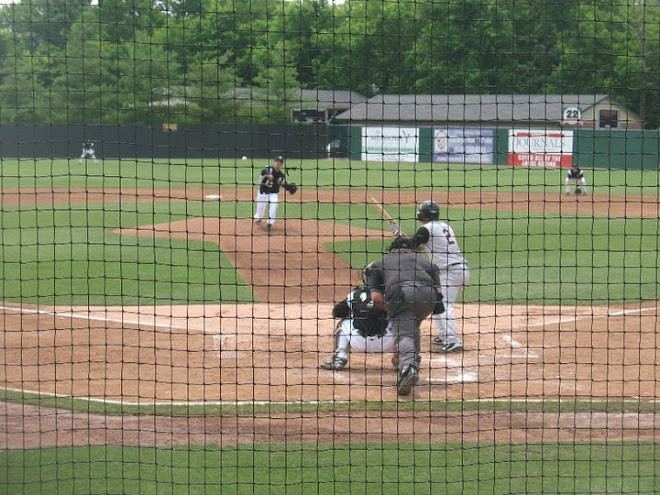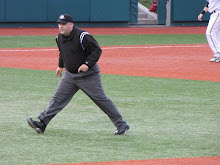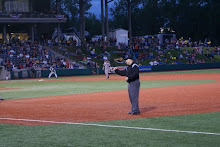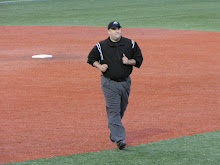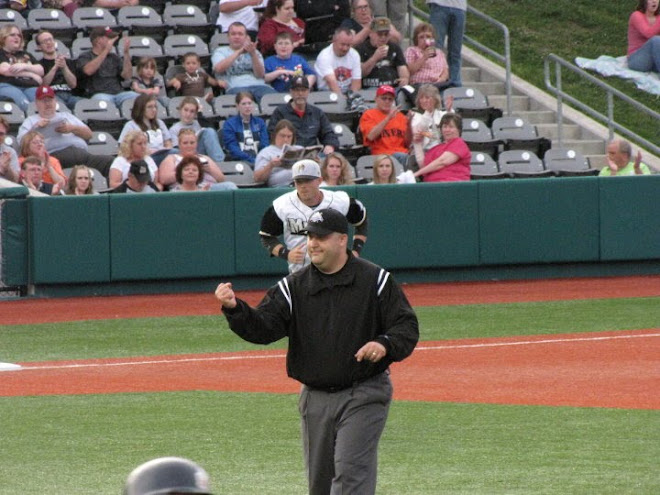This question was asked to me a week ago by one of my friends. I almost had this happen this summer. Let's see what you have for the call.
Batter hits a weak ground ball in foul territory down the first baseline. It hits something and starts heading back to fir territory. I comes to a rest up against 1st base in foul territory. Fair or foul?
Friday, October 7, 2011
Baseball Manager Epic Meltdown (139)
This ejecetion is worth watching. If you are ever interested in how minor league umpires are talked to, this is a good example. Every minor league umpire I know has a story of an ejection like this. WARNING.....THERE IS SOME SERIOUS LANGUAGE ON THIS VIDEO.
When is enough...enough?
Earlier this year, I ejected a coach for arguing balls and strikes. After the game when I was writ ting up my report, I was asked by a younger umpire where I draw the line when it comes to arguing the strike zone. It was a very good question so I thought I would share my thoughts on it here.
Arguing balls and strikes happens all the time and in all honesty, I don't have a problem with that. As a coach, I love to tip toe on the line when it comes to arguing the strike zone. As an umpire, I love to watch coaches tip toe the line. So, in many ways, I am a little more understanding when it comes to this than many other umpires.
Before I really get into this, let me tell you about the argument that caused the ejection. I was working the field and my partner was really hearing it from one side on his strike zone. They were making comments on pretty much every other pitch and he was just letting it go. Well around the 3rd inning, it was getting to the point where if he didn't say something, I was going to. They were being ridiculous. Finally in the bottom of the 3rd, there was a pitch off the plate, belt high the he called a ball. The coach start making comments. He walked down and told him to knock it off. The coach automatically yelled to his catcher, "Was that a strike?" At this point, I would have thrown him out. But my partner didn't. He told the coach, "Last warning. Not another word." If you are ever going to tell a coach not to say another word, you better back it up. Well, the coach kept on asking the catcher where it was. My partner started walking back to the plate. Well, at this point, the told the catcher to "freeze it for him for 5 seconds so he might be able to see it." At this point, being the senior umpire, I had to get involved so I walked over, told to coach to knock it off.
He wanted to argue that he could talk to his catcher whenever he wanted. I told him that he was showing up my partner and needed to stop. He kept arguing so after about a minute, I said, "I'm done, not another word about the strike zone or talking to your catcher, and I mean it." He looked at me for about 10 seconds and then said, "I can talk to whoever I want, whenever I want." At this point, I tossed him.
As an umpire, trying to figure out where the line is when it comes to arguing balls and strikes is a tough one. You don't want to make it seem like you are looking for an ejection but you also can't seem like a push over. When I am working a game behind the plate, I live by the following. If they are just moaning and groaning but then letting it go or asking the catcher where a pitch was on close pitches. I let that go. If they start making comments to me, I will let that go for a little while. If the comments towards me last for more than a batter or two, I will walk down the line and tell them to knock it off. At that point, what happens is in the coaches hands. As long as cursing is not involved and it isn't personal, I will not eject a coach for saying something from his dugout right away. I will give them the opportunity to decide what happens next.
I guess what I am saying is as long as the arguing is coming from the dugout, I will put up with it for a while. But if a coach leaves his position to argue balls and stikes, it's a completely different story. I do not have tolerance for that.
If a coach comes out of the dugout screaming about balls and strikes, you need to take a firmer stance on that. To me, I give one quick warning then toss them if they don't stop. If a third base coach says something to me quietly while walking back to the dugout, I might let that go depending on what was said.
The line is different for each umpire. Some of us have rabbit ears and others a oblivious to the comments. What we all should do, is try to find that place in the middle. Being soft is not a good thing but then again neither is being too much of a hard ass.
In the end, as an umpire you are going to be criticised, that's just part of the job. The question each of you have to ask yourself is how much you are willing to take.
Arguing balls and strikes happens all the time and in all honesty, I don't have a problem with that. As a coach, I love to tip toe on the line when it comes to arguing the strike zone. As an umpire, I love to watch coaches tip toe the line. So, in many ways, I am a little more understanding when it comes to this than many other umpires.
Before I really get into this, let me tell you about the argument that caused the ejection. I was working the field and my partner was really hearing it from one side on his strike zone. They were making comments on pretty much every other pitch and he was just letting it go. Well around the 3rd inning, it was getting to the point where if he didn't say something, I was going to. They were being ridiculous. Finally in the bottom of the 3rd, there was a pitch off the plate, belt high the he called a ball. The coach start making comments. He walked down and told him to knock it off. The coach automatically yelled to his catcher, "Was that a strike?" At this point, I would have thrown him out. But my partner didn't. He told the coach, "Last warning. Not another word." If you are ever going to tell a coach not to say another word, you better back it up. Well, the coach kept on asking the catcher where it was. My partner started walking back to the plate. Well, at this point, the told the catcher to "freeze it for him for 5 seconds so he might be able to see it." At this point, being the senior umpire, I had to get involved so I walked over, told to coach to knock it off.
He wanted to argue that he could talk to his catcher whenever he wanted. I told him that he was showing up my partner and needed to stop. He kept arguing so after about a minute, I said, "I'm done, not another word about the strike zone or talking to your catcher, and I mean it." He looked at me for about 10 seconds and then said, "I can talk to whoever I want, whenever I want." At this point, I tossed him.
As an umpire, trying to figure out where the line is when it comes to arguing balls and strikes is a tough one. You don't want to make it seem like you are looking for an ejection but you also can't seem like a push over. When I am working a game behind the plate, I live by the following. If they are just moaning and groaning but then letting it go or asking the catcher where a pitch was on close pitches. I let that go. If they start making comments to me, I will let that go for a little while. If the comments towards me last for more than a batter or two, I will walk down the line and tell them to knock it off. At that point, what happens is in the coaches hands. As long as cursing is not involved and it isn't personal, I will not eject a coach for saying something from his dugout right away. I will give them the opportunity to decide what happens next.
I guess what I am saying is as long as the arguing is coming from the dugout, I will put up with it for a while. But if a coach leaves his position to argue balls and stikes, it's a completely different story. I do not have tolerance for that.
If a coach comes out of the dugout screaming about balls and strikes, you need to take a firmer stance on that. To me, I give one quick warning then toss them if they don't stop. If a third base coach says something to me quietly while walking back to the dugout, I might let that go depending on what was said.
The line is different for each umpire. Some of us have rabbit ears and others a oblivious to the comments. What we all should do, is try to find that place in the middle. Being soft is not a good thing but then again neither is being too much of a hard ass.
In the end, as an umpire you are going to be criticised, that's just part of the job. The question each of you have to ask yourself is how much you are willing to take.
Tuesday, October 4, 2011
How would you rule
I remembered this play while watching Jon Jay of the Cardinals run over the catcher.
Runner on 2nd, 1 out. The batter hits a line drive to center. The runner from 2nd rounds third. The throw is coming in. The runner is coming home. The ball is cut off but the catcher acts like he caught it and blocks the plate. The runner absolutely lights the catcher up. Do you make a call here?
This happened in a Frontier League game where I was behind the plate. Actually it was my first Frontier League plate.
Runner on 2nd, 1 out. The batter hits a line drive to center. The runner from 2nd rounds third. The throw is coming in. The runner is coming home. The ball is cut off but the catcher acts like he caught it and blocks the plate. The runner absolutely lights the catcher up. Do you make a call here?
This happened in a Frontier League game where I was behind the plate. Actually it was my first Frontier League plate.
Subscribe to:
Posts (Atom)
